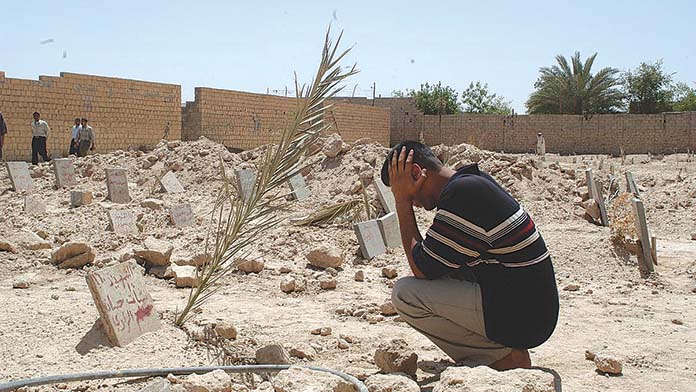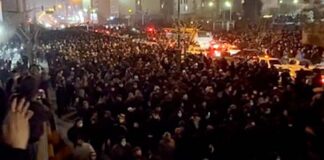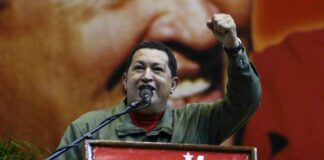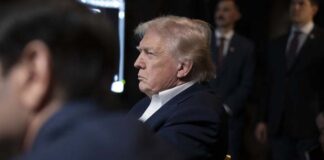The US assault on Fallujah in 2004 was one of the US’s worst war crimes in Iraq. Angus Dermody explains how the US set out to crush resistance to foreign occupation
Twenty years ago US troops in Iraq launched the first of two bloody assaults on the city of Fallujah.
While the entirety of the US invasion and occupation of Iraq was criminal, the desolation of Fallujah in 2004 should stand as a reminder of the bloody nature of US power.
Fallujah, a city with a population of 300,000 sixty kilometres west of Iraq’s capital Baghdad, had become a symbol of the Sunni insurgency that took root in Iraq after the US invasion in March 2003.
On the evening of 28 April 2003 hundreds of Iraqi civilians assembled at a school housing US troops in Fallujah to demand that the troops withdraw.
The soldiers opened fire on the crowd, killing 17 civilians and wounding more than 70.
Despite US Vice-President Dick Cheney’s belief that coalition forces would be “greeted as liberators” by the people of Iraq, the summer that followed saw a significant increase in attacks on Western troops.
The motivations of the Iraqi insurgents were varied, but they were united in their opposition to the US. Many would have remembered the horrors of the US’s earlier war on Iraq in 1990-91.
Fallujah had been bombed in 1991 by coalition forces who struck its largest market, killing up to 150 civilians. Over the next decade the US bombed Iraq hundreds of times, imposing brutal sanctions that caused malnutrition and denied the population basic medicines.
Many more would have been compelled to resist by the immediate reality of the invasion and occupation.
The US occupiers allowed Iraq to descend into lawlessness, with widespread looting of government ministries, schools and hospitals.
They did little to reconstruct basic infrastructure, with the country left in ruins and unemployment rampant.
The revelation in April 2004 of the US’s horrific abuse and torture of Iraqi prisoners at Abu Ghraib prison discredited the occupation and radicalised a generation.
Iraq also had a proud tradition of nationalist revolts against British rule. Sunni and Shia Muslims united in revolt in 1920 against the plan to establish direct British control over Iraq.
This was followed by further revolts against the British-installed King that led to his toppling in 1958.
The invasion and occupation of Iraq was never about getting rid of Saddam Hussein and introducing democracy to Iraq, it was about US control of oil.
Iraqis were opposed to the dictatorship of Saddam Hussein, but also to the US occupation that followed. As is the case in Palestine right now, Iraqis had a right to resist the invasion and occupation of their country.
Battle of Fallujah
A turning point came on 31 March 2004 when insurgents in Fallujah ambushed and killed four private military contractors from the American mercenary company Blackwater. Images of the mutilated bodies of the Blackwater contractors were broadcast around the world.
The response from the US was immediate. The next day the US’s deputy director of operations in Iraq, Brigadier General Mark Kimmitt, promised to “pacify that city”.
Operation Vigilant Resolve, as the assault on Fallujah was officially referred to, began on 4 April, when 2000 American troops surrounded and cordoned off the city.
Civilians were prevented from leaving, airstrikes levelled homes and mosques, and the two main hospitals were closed. Hundreds of civilians would be killed within the first week. One woman told the media that, “we knew we would be wiped off the Earth”.
As the Marines advanced further into Fallujah they were met with fierce resistance.
The horrific scenes rallied both the Sunni and Shia resistance throughout Iraq. Politicians including British PM Tony Blair, facing pressure at home, expressed their concern about the radicalising potential of the assault.
Sunni leaders on the occupation’s Iraqi Governing Council threatened to resign in protest.
Just six days into the offensive, on 9 April, US Central Command ordered the Marines to suspend all offensive operations in Fallujah. The fighting continued until 30 April, with the city still under the control of the insurgency.
At least 800 Iraqis were killed during the First Battle of Fallujah, approximately 600 of them civilians. Hundreds had to be buried in the former football field of the Fallujah Sports Club because Marines had occupied the main cemetery.
The assault lasted less than a month and ended in embarrassment for the US forces.
When they attempted to send the 2nd Battalion of the newly-formed Iraqi Civil Defence Corps to Fallujah they refused to go, saying that they had not signed up to kill other Iraqis. Part of the 36th Battalion mutinied after fighting in Fallujah for 11 days.
On 1 May the Marines withdrew from Fallujah and turned over operations to the Fallujah Brigade, a newly created unit made up of former Iraqi military personnel. They would eventually disband and surrender the weapons the US had provided them to the insurgency.
Bloodiest battle
The Second Battle of Fallujah, Operation Phantom Fury, was the single bloodiest battle of the Iraq War. After the withdrawal of the Marines in May, Fallujah was continuously bombed by the US and the number of insurgents there doubled.
On 7 November 2004, 10,500 US troops, 850 British troops, and 2000 Iraqi national guards launched a ground invasion of Fallujah in an attempt to drive out the insurgency and establish the Iraqi Interim Government’s control of the city following the Coalition’s transfer of power in June.
Before the assault was launched many civilians fled the city, but 30-50,000 civilians still remained. Men aged 15 to 50 were prevented from entering or leaving, warned by US forces that “if they do, they will become a target”.
US forces went from house to house killing Iraqis in their own homes where their bodies were left to rot. US snipers positioned on roofs gunned down anyone who wandered into the street. Troops were caught on camera executing wounded and unarmed insurgents.
One of the first targets of the assault was the Fallujah General Hospital, believed by occupation forces to be a propaganda centre due to the high number of reports of civilian casualties coming from the hospital.
The hospital was seized and health workers were prevented from leaving to tend to the wounded in other areas of the city, where the few remaining medical clinics had been bombed.
An aid convoy from the Iraqi Red Crescent was denied entry into Fallujah because the US military deemed that there was no need for it. The UN special rapporteur declared that the occupation forces were using “hunger and deprivation of water as a weapon of war against the civilian population”.
The US launched white phosphorus munitions into the city during the assault; a chemical weapon which melts the flesh down to the bone.
Despite clear evidence of its use, military officials denied it until 2005 when an official military publication described how it proved in Fallujah to be “an effective and versatile munition” and a “potent psychological weapon”.
Depleted uranium munitions were used in an attempt to clear bunkers, contaminating drinking water, food and soil. In total 1200 tonnes of depleted uranium were used on Iraq by the US following their invasion in 2003.
One eyewitness described a sickening incident where the Iraqi National Guard directed families to leave their homes bearing white flags and gather at a mosque, only for US troops to open fire from the nearby rooftops, killing many of them.
At least 800 civilians and up to 2000 insurgents were killed by the time the occupation forces withdrew from Fallujah on 23 December 2004.
When Doctor Salam Ismael visited the city the following month, he reported that, “A wave of hate had wiped out two-thirds of the town… in most of the houses, the bodies were of civilians.
“It became clear to us that we were witnessing the aftermath of a massacre, the cold-blooded butchery of helpless and defenceless civilians.”
City of ghosts
Fallujah had been referred to as the city of mosques. After 2004 it became a city of ghosts. Two thirds of Fallujah was made uninhabitable; as many as 36,000 of the city’s 50,000 homes were destroyed.
Entire neighbourhoods were bulldozed to cover up the crimes committed by the occupation forces. In some areas US forces were reported to be removing the soil and hosing down the streets to hide the use of chemical weapons.
While the US and British governments denied that they used depleted uranium, or that it could cause long-term health risks, its impact was clear.
In the years that followed, 14.7 per cent of all babies born in Fallujah had birth defects and the rate of leukaemia increased by 2200 per cent, significantly higher than the worst of the lasting effects in Hiroshima.
Babies were born with missing limbs, multiple heads and heart defects.
Nobody responsible for the crimes committed in Fallujah has been brought to justice.
Australia was directly implicated, with Australian general Jim Molan serving as Chief of Operations for the coalition forces in Iraq, and responsible for planning the Second Battle of Fallujah and the war crimes that resulted.
As a reward for his role in the butchery of Fallujah, he received the Distinguished Service Cross and was hand-picked by former PM Scott Morrison to serve as a Liberal senator in 2017.
The armed resistance movement that grew out of the despair of the occupation and the assaults on Fallujah humiliated the West.
But it was unable to grow into a unified national movement, and the West responded by creating divisions between Sunni and Shia Muslims to stoke sectarianism.
A unified movement from below could have driven the US out of Iraq and put a stop to the horrors of the occupation.
The horrific scenes that played out in Fallujah in 2004 are being repeated right now in Gaza, with the same forces backing it. Stopping the slaughter for good means building the sort of fight that can smash the imperialist system.






